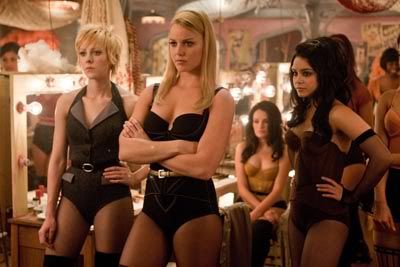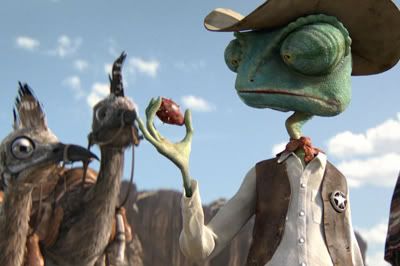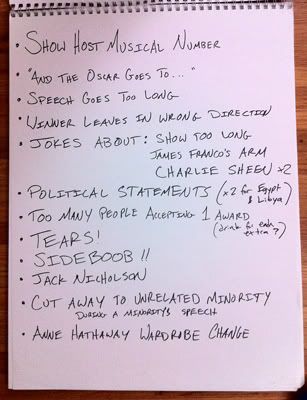
If the filmography of Robert Rodriguez were projected onto the wall of Plato's cave, the fever dreams of its sorry inhabitants might come out something like this. "Sucker Punch" is an asylum for every unoriginal impulse that strikes director Zack Snyder's attention deficient mind. It is an unmitigated disaster of storytelling—thematically diarrheic with visuals to match. This hopeless post-"Inception" melodrama isn't based on a comic book like either of Snyder's previous efforts, but every genre cliché carries over tenfold.
Like a pockmarked teen with an anime fetish, Snyder's convoluted revenge flick plays out with a cast of buxom babes who look as though they might bleed mascara when cut. Stuffed into absurdly tight-fitting outfits, gals with names like Rocket, Baby Doll, and Sweet Pea unload thousands of shells from their semi-automatic rifles and leap columns of flames in when-exactly-was-this-cool-again slow motion.
The tiered fantasy worlds of "Sucker Punch" might be exciting if they corresponded in any way to the next reality over. Probably the most asinine aspect of Snyder and Steve Shibuya's screenplay (I say probably because competition is steep) is that while our protagonist is fighting a 20-foot tall sourpussed samurai or fleeing a castle from an apoplectic dragon, we are meant to believe she is really—how should I put this—doing a sexy dance. A major structural component of "Sucker Punch" is Baby Doll's escape from incarceration, a feat that necessitates trinkets such as a map, knife, lighter, and key, all of which are obtained by distracting their male overlords with… exotic dancing.
For every item on the checklist, Baby Doll gyrates—though while she cuts loose, she imagines she is annihilating clockwork Nazi soldiers in the trenches of a steampunk World War II, or tearing apart an android army on a futuristic bomb-strapped bullet train. The latter is set to a cover of the Beatles' "Tomorrow Never Knows," in which John Lennon once sang, "Turn off your mind," and "Lay down all thought." Snyder seems to have appropriated that message quite literally.
The bigger problem is that Snyder throws dramatic tension out the window by creating a fantasy world where nothing is at stake. The laws of these alternate realities are unclear at best, and the sequences themselves are purely masturbatory given that whatever happens is only loosely tied to the story we're supposed to be following. I might be more forgiving of that conceit if Snyder really wowed, but "Sucker Punch" doesn't bring a single idea to the table that hasn't been done to death in movies or video games. Snyder does so much recycling that he ought to receive special commendation from Greenpeace.
It's equally hard to muster up sympathy for his characters outside of their imaginary adventures. Snyder has a bad habit of using trauma as a binding agent between them and the audience; other than that Baby Doll fell under the shadow of an evil foster-father before imprisonment, there isn't a single reason why we should care about her. She is as devoid of genuine personality as the rest of the cartoon cast.
"Sucker Punch" might have been a blast if the tone was more in line with "Scott Pilgrim" or even "Kill Bill." Gratuitous action can be fun—just don't ask me to take it seriously. The worst of Snyder's misconceptions is that he can simultaneously blow shit up and pull our heartstrings. That he directs schlock under the pretense of style is laid bare in this, his first original work. "Sucker Punch" is not only brain dead, it's contagiously stupid. It's a high school sophomore's juvenile doodles on an 82 million dollar budget. If Snyder's filmography were projected on the wall of Plato's cave, I think those poor bastards would welcome the first disorienting rays of sunlight and their freedom with open arms.
1.5/5





















